

- EDITIONS:
 Spanish News Today
Spanish News Today
 Murcia Today
Murcia Today
 Alicante Today
Alicante Today
article_detail
Spanish News Today Editors Roundup Weekly Bulletin May 31

TOP STORIES: "Are we headed for the hottest summer ever?" and "How new building regulations in Spain could affect you (and your pocket!)"
Simon & Garfunkel sang, “May, she will stay… June, she’ll change her tune.” Well, not quite true because May is leaving us this weekend and – for the moment, at least – June looks set to bring us a continuation of the hot-and-getting-hotter temperatures we’ve been having lately.
Talking of hotting up, it has all been kicking off in Spain this week, from new rules being introduced for lifts, campervans and scooters to controversial new bills being passed in parliament…
Hello, summer!
This week, Spain has seen its first 40ºC+ days, namely in the Andalusian municipalities of Écija and Montoro, and these certainly won’t be the last incredibly hot days we see this summer.
Thanks to global warming, the summer of 2023 in the Region of Murcia, and indeed most of Spain and the wider world, was nothing short of a scorcher. According to the recent State of the Climate in Europe (ESOTC) report released by the Copernicus Climate Change Service, 2023 was actually the second hottest year ever recorded in Europe, right behind 2022.
With three out of the top five hottest years happening since 2020 and all ten being post-2007, it looks like blazing summers are becoming the new normal.
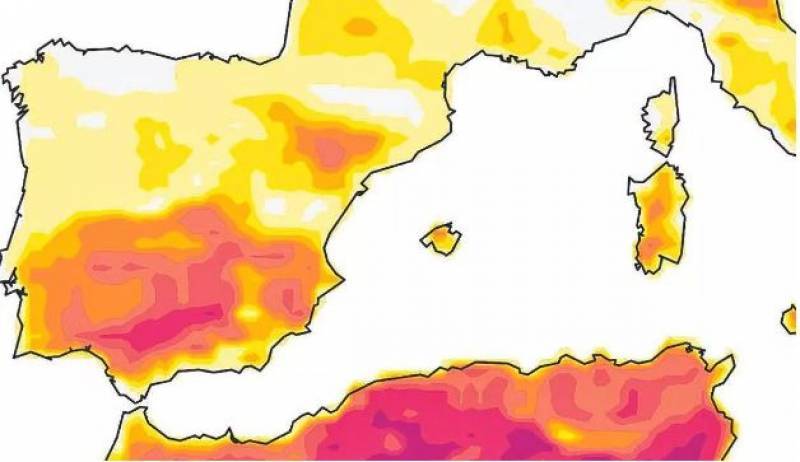
Within sunny southern Spain, the Region of Murcia saw about 40 sweltering days between June and September where folks experienced “thermal stress”. That’s defined as days when the real-feel temperature ranges between 38 and 46ºC. But did you know that Andalucía took the heatwave crown with a whopping 80 days of intense warmth? That’s quite the sizzling streak.
Now, these soaring temperatures don’t just leave us feeling parched and often with a bad case of sunburn; they also pose serious risks to our wellbeing. Prolonged exposure could lead to issues such as exhaustion or even heatstroke.
It might seem obvious, but the ESOTC report confirms that heat-related fatalities have risen by 30% over the past couple decades. Shockingly, 94% of the European zones surveyed (including the Region of Murcia) reported growth in heat-related casualties.
To put things into perspective, the hardest hit spots in the centre and southern Iberian peninsula see up to 50 excess deaths per million individuals every year due to excessive heat. While still concerning, the Region of Murcia experiences fewer fatalities compared to other Spanish territories, averaging roughly 20 to 30 additional deaths annually per million inhabitants.
So, how bad was it during 2023’s record-breaking summer in Murcia? Well, based on provisional stats, the regional government logged 11 unfortunate passings caused by severe heat exposure. Although this number puts the Region near the bottom among Spanish provinces, any loss of life because of rising mercury levels isn’t something to take lightly.
In addition, the world’s seas, including the Mediterranean, are heating up more than ever and sooner than expected, creating a ‘cauldron’ effect.
In our Editor’s Roundup Weekly Bulletin from April 26, we brought you the news that some experts thought this summer would buck that trend, being slightly cooler than previous years thanks to the effects of La Niña. It’s hard to tell but in general, and on a global scale, the data seem to suggest that there is a general trend year-on-year for progressively higher temperatures. Just this week in India, they recorded temperatures as high as 52.9ºC and the first heat-related death of the year in New Delhi.
So, yes, while it’s nice to welcome warm temperatures in summer, enjoying the beach and pool, please – whether 2024 ends up being the hottest on record or not – take care this summer season. Stay hydrated, use suncream and take regular breaks from the sunshine.
Scoot route
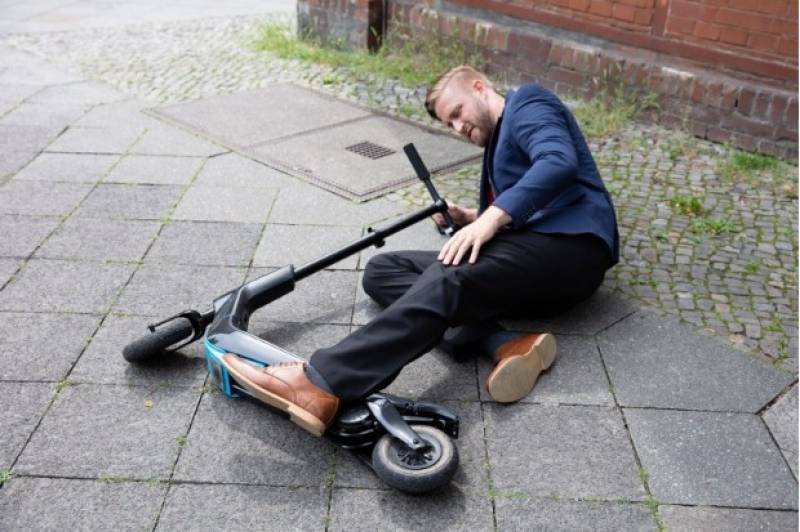
The rumours have been brewing for several years but now it’s official – the Spanish government is determined to roll out fresh regulations specifically aimed at electric scooters that will come into effect in 2026.
The biggest change is that in two years, every personal mobility vehicle owner will need to insure their ride with third-party cover for personal and material damage. Think car, truck and motorbike civil liability policies, but designed especially for lightweight wheels.
But in order to secure that insurance, riders will have to register their scooters beforehand. Once approved, you’ll receive a license plate or nifty badge identifying your set of wheels.
Mark your calendars for Jan, 2026: cut-off time for registration with the General Directorate of Traffic (DGT).
But don’t worry, cyclists, as the rule changes don’t apply to electric bikes yet.
The good news is that there’s no need to break the bank, according to insurance experts. Lower risk means cheaper premiums compared to typical motor vehicle policies. Plus, reduced likelihood of accidents makes this whole deal pretty enticing.
Eager cities such as Barcelona, Valencia and Zaragoza aren’t waiting around, and they’ve already introduced local requirements on insurance and licencing in an attempt to make the roads safer for e-scooter riders and other road users.
From two wheels to four, there’s big news for campervan and motorhome owners at the European level. Spearheaded by Spain’s Association of the Caravaning Industry (Aseicar) and the European Caravaning Federation, the European Parliament finally gave the thumbs-up to spruce up Europe’s RV scene.
This exciting update will raise the maximum allowed weight for Type B driver licences from 3,500kg to 4,250kg, meaning that those with a garden-variety licence will be permitted to drive a much bigger rig.
This is brilliant news for both campervan manufacturers and owners. On the one hand, designers will have more freedom to include very sought-after features like more robust air conditioning systems, larger capacity water tanks and solar tanks on the exterior of vehicles.
On the other, drivers will be able to take to the open roads in more comfort and guaranteed safety. These changes will come into force at the beginning of next year. Happy camping!
Don’t forget to join our Driving in Spain Facebook group for all the latest motoring and travel news
Uplift

High-rise living wouldn’t be possible without Spain’s half-million elevators, which are used by hundreds of thousands of people every single day. But next time you step inside one, think of this: more than 400,000 lifts in the country have been in service for upwards of 30 years.
Not only does Spain rank high worldwide for lift density, but it boasts Europe’s highest instalment ratio per capita. Given the scale of reliance, change is on the horizon.
Starting on July 1, stricter lift guidelines will target building owners, requiring investments by communities of owners of up to 30,000 euros to modernise aging elevators. Among the improvements are:
- Door sensors to prevent people getting stuck
- Enhanced stability so people aren’t jostled around
- Two-way communication systems to be used in case of emergency
- Load controls to safeguard cabins from overloading.
The new rules will mainly affect older lifts or ones that haven’t been serviced recently, as most of the newer ones are already fitted out with these safety devices as standard.
Murcia
As of this Saturday June 1, there is a new bus timetable for buses going to and from Corvera Airport. For the summer season, there will be buses running more frequently to the airport, but they still only connect Corvera with the bus stations in Cartagena and Murcia city. From there, of course, you can find a bus to take you to any other town in the Region.
The new buses run every single day of the week this summer, and will continue to do so until October 6. As for the rest, it’s all the same – the price is still €1.85 for a ticket, and your best bet is still to buy it from the bus driver directly on the bus. You can buy it in advance on the website, but there’s probably not much point.
- You can find the revised bus schedule here
2024 is the year that Spangles Ladies’ Harmony Chorus turns 20. The Murcia singing group was founded by Lyn Baines and Anthea Prentice back in 2004, and since then has grown to become one of the most popular local expat groups in the Region. They regularly sing at fundraising events and concerts in towns and venues across Murcia, and they’ve got some very special birthday celebrations planned for this year.
 They’ve already welcomed several new members for this year, who joined them in singing at two invitational concerts in Jalón and Calpe in March and a Spring Concert in Sucina in April. Afternoon Teas are something Spangles is famous for, so it was an obvious choice for one of their 20th anniversary events this month, and they performed at a sell-out event at the Butterfly Garden. Naturally, they donated all proceeds to charity.
They’ve already welcomed several new members for this year, who joined them in singing at two invitational concerts in Jalón and Calpe in March and a Spring Concert in Sucina in April. Afternoon Teas are something Spangles is famous for, so it was an obvious choice for one of their 20th anniversary events this month, and they performed at a sell-out event at the Butterfly Garden. Naturally, they donated all proceeds to charity.Other events are being planned for later this year, including a Spangles trip to Prague in November to represent Los Alcázares in the Gloria Festival, singing at the St Vitus Cathedral.
Property news, now, and it turns out that nearly one in every four homes sold in the Region of Murcia is purchased by a foreign (non-Spanish) buyer. This is according to the most recent property data released by the College of Registrars for the first quarter of 2024, which has stated that the number of home sales increased between January and March of this year, up to 5,902 registered sales, and that 23.36% of those were to foreigners.
This places the Region of Murcia as the autonomous community in Spain with the fourth highest proportion of foreign buyers, behind the Balearic Islands (31.72%), the Valencian Community (28.79%) and the Canary Islands (26.01%). In reality, this figure of 23.36% is a little bit lower than in the first quarter of 2023, when foreigners bought 24.38% of the houses that were sold, but in real terms it is an increase because total home purchases have risen by more than 20%.
By nationality, it’s still the British who continue to buy the most homes in the Region of Murcia, making up around a quarter of all the homes purchased by buyers from other countries – that is to say, around one in every eight of the total number of home sales.
After them come Moroccan and Belgian buyers, with a 14.37% market share of the foreign property purchases apiece.
Incredibly, only around half of the foreigners who purchased homes in the Region of Murcia so far this year needed a mortgage to do so, with the rest paying for it outright.
None of this will come as a surprise to local estate agents in Murcia, who have been saying for months now that the flood of demand from foreigners looking to buy villas and apartments in the area means they barely have enough homes for sale to meet that demand!
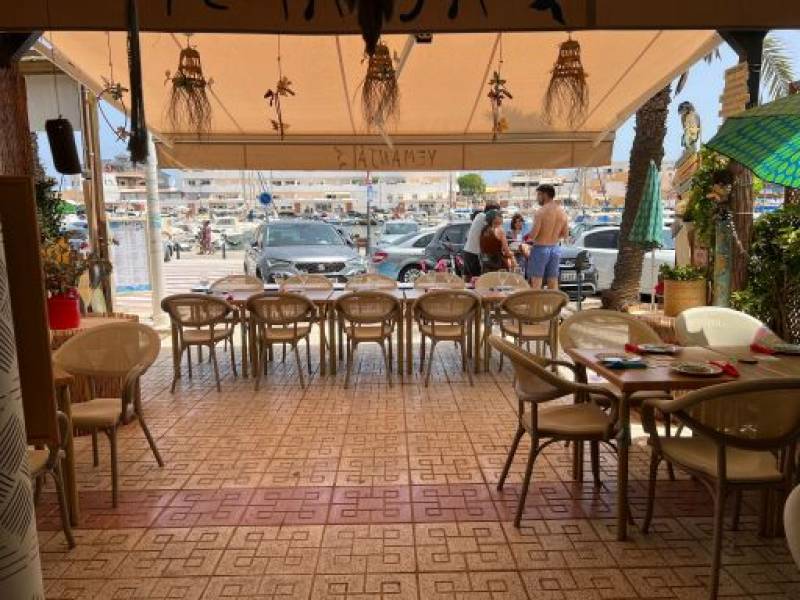 Finally, if you’re looking for some good eats this weekend, trying booking a table at Café Bar Yemanjá, located on the waterfront in Cabo de Palos. Owner Magdalena has added some exciting new creations to the menu, like gluten-free BBQ spare ribs and beef ribs, both slow cooked in the oven and served with potatoes.
Finally, if you’re looking for some good eats this weekend, trying booking a table at Café Bar Yemanjá, located on the waterfront in Cabo de Palos. Owner Magdalena has added some exciting new creations to the menu, like gluten-free BBQ spare ribs and beef ribs, both slow cooked in the oven and served with potatoes.Another new addition to the menu is the oven-baked heart of artichoke served with truffle foie and ham, with vegan and vegetarian options also available. Actually, anyone who has ever been there can tell you that, with the friendly, familiar service, pretty much any dish can be catered to your dietary needs, whatever they may be.
As Magdelana herself likes to say, she feels that all her customers, old and new, are guests in her home and she just wants to make sure that everybody leaves happy. Check it out if you’ve never been, and if you have, then it’s probably about time for a return visit!
For foody events, craft markets, sports and other events coming up soon in the Region of Murcia, see our EVENTS DIARY:
Spain
It’s official. As of this Tuesday just gone, May 28, Spain, Ireland and Norway are officially recognising the State of Palestine, as well as Israel, following pre-1967 borders and with East Jerusalem as the capital of Palestine. Predictably, Israel has criticised the move, likening it to legitimising the terrorist organisation Hamas as a government on a par with that in any other global nation.
In their defence, Spain and the other new countries that are recognising Palestinian sovereignty say they’re just trying to help bring about a two-state solution and achieve peace. This is not a move against Israel, Spanish PM Pedro Sánchez has insisted, and they’ve even said that, as well as recognising both states, they will try to convince Arab and Muslim countries in Africa which currently do not recognise the State of Israel to do so.
 In other geopolitical news, Spain has also agreed a deal to send €1.1 billion worth of military aid to Ukraine over the next decade, following a visit to the country by Volodymyr Zelenskyy, though not everyone is happy about it, even those within the coalition government itself. Basically, people are accusing Sánchez of acting unilaterally, taking decisions about the country’s finances and future that are not transparent and which have not been properly discussed with advisers.
In other geopolitical news, Spain has also agreed a deal to send €1.1 billion worth of military aid to Ukraine over the next decade, following a visit to the country by Volodymyr Zelenskyy, though not everyone is happy about it, even those within the coalition government itself. Basically, people are accusing Sánchez of acting unilaterally, taking decisions about the country’s finances and future that are not transparent and which have not been properly discussed with advisers.Perhaps something like the Amnesty bill, which was finally ratified in Congress this week. It basically grants immunity from criminal charges for people involved in the illegal Catalan referendum of October 1, 2017 and the subsequent unilateral declaration of independence on the 27th. With this milestone move, Sánchez has kept to his side of the bargain with the pro-independence parties that guaranteed his second term in office, but which has cost him so dearly in the eyes of the public.
As for the Medusa Beach Club in Playa de Palma, Mallorca, whose restaurant terrace collapsed last week, causing four deaths and 14 injuries, it has since been revealed that the restaurant did not have the necessary municipal licence for its terrace. An investigation by municipal technicians found that structural overload may have caused the collapse. The terrace had undergone partial renovations, but the central section had not been updated, leading to the technical failure.
Mallorca fire chief Eder García explained that a large group of 12 Dutch tourists gathering on one side of the terrace contributed to the collapse, and Mayor Jaime Martínez has emphasised the need for a safety inspection plan in tourist areas to prevent similar incidents in the future.
Alicante
At the end of April, a gruesome discovery on a farm in the small Alicante town of Jijona sent locals into a tail-spin, but yet another macabre find has brought the authorities one step closer to solving a case which has gripped the Costa Blanca.
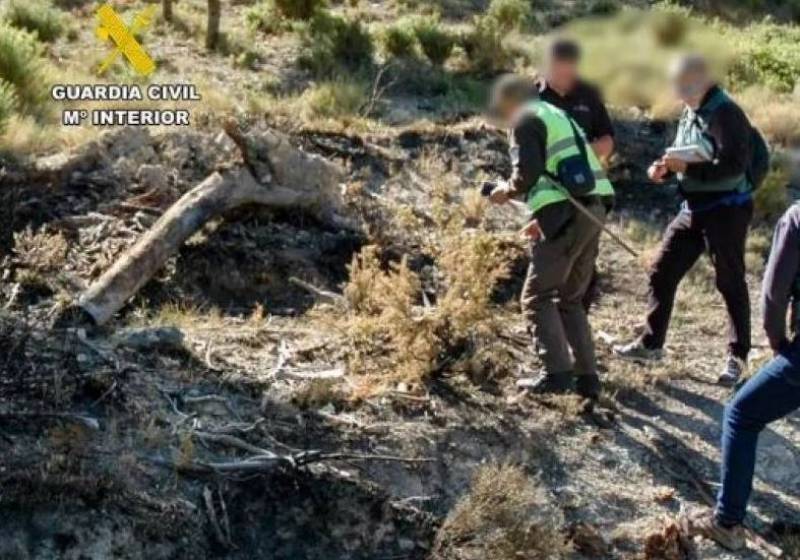 Last Friday, May 24, a Guardia Civil search team uncovered the bodies of a 61-year-old man and a 48-year-old woman in the Partida el Espartal area of the town. Both were in an advanced stage of decomposition.
Last Friday, May 24, a Guardia Civil search team uncovered the bodies of a 61-year-old man and a 48-year-old woman in the Partida el Espartal area of the town. Both were in an advanced stage of decomposition.At the moment, investigators are working on the assumption that one of the corpses corresponds to a dismembered human arm that was uncovered by a dog on a nearby farm last month.
All evidence seems to confirm that the deceased are a married German couple who lived in Mallorca and hired a rental car in January, when they were last seen. Days before the bodies were discovered, the car was located in a nearby industrial estate. Workers in the area informed the Guardia Civil that the vehicle had been parked there for a few months without anyone moving it.
In the area where the bodies were found a shotgun was also recovered, with “obvious signs” that the man had died by suicide, according to investigating officers. At the moment, the woman’s cause of death remains “unclear”.
While the investigation is still in its early stages, police are assuming that the German couple parked up the car and walked together to the area where their bodies were eventually discovered, most likely sometime in late January. However, the Guardia Civil has stressed that confirmation of their identities and causes of death will not be conclusively known until after the post-mortems have taken place.
Frustrations continue to grow in Andalucía’s Málaga as this week, the Spanish Transport Minister, Óscar Puente, delivered a hammer blow and completely dismissed calls to lower motorway tolls while planning for the new coastal railway gets underway.
To add insult to injury, the minister has just confirmed that his department is looking into scrapping the tolls on the AP-7 road that bypasses Alicante, a decision that seeks to alleviate traffic and reduce accidents on the busy A-70 that circles the city.
The Alicante intervention might be sorely needed, but that doesn’t mean the Costa del Sol doesn’t face similar problems. Both roads cater to upwards of 100,000 vehicles every day and have several known accident black spots.
What’s more, the Málaga motorway is much longer, stretching 82.7 kilometres to San Pedro Alcántara and its fares are significantly higher, ranging between 5.25 euros and 8.60 euros depending on whether it is low or high season.
On the other hand, the section of road that could soon become toll free in Alicante is just 33 kilometres long and passenger cars pay 1.40 euros.
The Orihuela Costa is really upping its festival game this year and one of the most eagerly anticipated events on the calendar is taking place for the first time ever this Saturday June 1: Orihuela Costa Pride.
The Emerald Isle La Florida plays host to the inaugural event, a milestone that promises to celebrate love, diversity and self-expression in one action-packed, fun-filled day.

From early morning to late night, immerse yourself in a colourful tapestry of artistic talent, with electrifying performances from celebrated local DJs, drag queens, vocalists and dynamic dance groups.
The festival kicks off with the Pride Parade, which commences between 11am and 11.30am, travelling from the Emerald Isle to the Abbey Tavern before returning to the heart of the celebrations at around 1pm.
Throughout the day, browse through bustling market stalls, sample mouthwatering culinary treats and revel in festive vibes.
The Emerald Isle will throw the doors open at 10am, starting the day with DJ Luscious at 1pm followed by the fabulous NIKkI G who will open the Pride entertainment at 2pm.
- For more information about this fantastic event, visit the Orihuela Costa Pride 2024 Facebook page
In Alicante city, the Hogueras de Alicante (Bonfires of St John) fiesta are celebrated around the summer solstice every June, showcasing colourful parades, electrifying performances, thrilling fireworks displays and, of course, plenty of enormous bonfires.
This year, the celebrations will kick off on 1st June and culminate on the 24th, but in between visitors and locals will be captivated by almost daily events including processions, flower offerings, bull fights, concerts and late-night street parties. And don’t forget the regular mascletà – deafening firecrackers launched at every opportunity.
Originally part of a pagan ritual marking the longest day of the year, these days the bonfires are stacked high with elaborate characters made of wood and cardboard, and adults and children alike spend the month erecting the huge figures all around the city. The celebrations culminate at midnight on June 24 when the bonfires are lit one by one.
Join the Costa Blanca What’s On and Where to Go Facebook group to see more things to do around Alicante province!
Andalucía
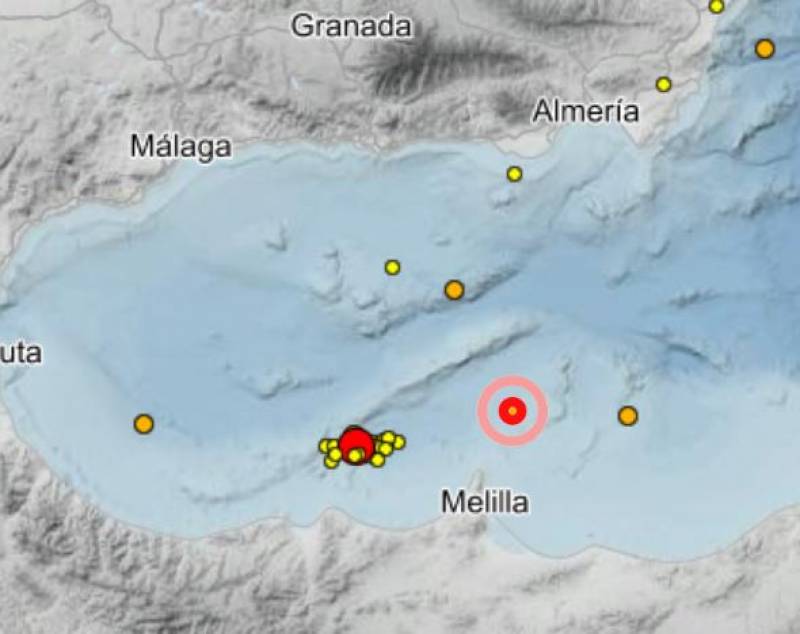 Last Monday, May 27, there was a seismic activity in the Alboran Sea between Andalucía and Africa that measured a stronger-than-usual magnitude 4.2 on the Richter scale. The quake was felt in the Spanish exclave of Melilla and also in several coastal towns in the provinces of Málaga and Granada.
Last Monday, May 27, there was a seismic activity in the Alboran Sea between Andalucía and Africa that measured a stronger-than-usual magnitude 4.2 on the Richter scale. The quake was felt in the Spanish exclave of Melilla and also in several coastal towns in the provinces of Málaga and Granada.Shortly after the quake, Spain’s National Geographic Institute (IGN) also recorded several aftershocks in the southern part of the Alboran Sea.
Beachgoers expecting a peaceful day by Cádiz’s Playa de Santa María del Mar got more excitement than they bargained for this week when police cleared the shore following reports of a suspected military device amidst breakwater rocks.
Concerned that it may explode, bomb disposal specialists from the Spanish Navy were speedily called in to assess and manage the situation, and the beach and surrounding areas were evacuated.
Nearly two tension-filled hours later, experts declared the enigmatic item harmless. According to official sources, the object “measures one and a half metres in length with a diameter of 3 inches, which match the dimensions of possible projectiles.”
However, it was impossible to tell on the spot whether the object was actually a missile or just an innocent object, as bits of concrete and vegetation were stuck to the outside. It has since been removed from the beach and a team of experts is working to identify its origin.
By law, only the Diving Unit of the Spanish Navy are permitted to deactivate or move any suspicious devices like this one, so the beachgoers who notified the emergency services when it was discovered absolutely did the right thing. There’s always a risk that such devices can still be live, so they should never be touched or tampered with.
And to finish, a story which rocked the British community in Andalucía last summer has reached its conclusion this week as 36-year-old UK national Jason McInerney was sentenced to nine years behind bars for a brutal attack on his girlfriend while on holiday in Spain.
 Although the Briton was tried in the UK, the events occurred in Marbella in July 2023. The court heard that McInerney subjected his ex-partner to days of emotional and physical abuse. Desperate for help, the terrified victim tried to alert a local pharmacy to her situation, but her attacker cottoned on and forced her into his car.
Although the Briton was tried in the UK, the events occurred in Marbella in July 2023. The court heard that McInerney subjected his ex-partner to days of emotional and physical abuse. Desperate for help, the terrified victim tried to alert a local pharmacy to her situation, but her attacker cottoned on and forced her into his car.As they sped along, his violence escalated and he stabbed her in the leg. Bleeding profusely and in fear for her life, the woman threw herself from the moving vehicles and was dragged along the road for some distance.
Incredibly, the brave victim survived. She alerted a member of the public who took her to a nearby beach bar and called the police.
Despite McInerney taking off with all of her possessions, including her passport, the resilient survivor made it back to Britain thanks to the intervention of the British Consulate in Málaga.
Upon returning home, the victim received urgent medical attention, revealing extensive injuries such as friction burns, a severe cut to her leg and multiple spinal fractures. Meanwhile, McInerney evaded capture in Spain, but ultimately faced justice once he resurfaced in the UK.
McInerney pleaded guilty to causing grievous bodily harm in Spain and Judge Sylvia de Bertodano handed him a nine-year custodial term at St Albans Crown Court.
You may have missed…
- Experience: “I was robbed in a Murcia hospital while having cancer surgery.”
Los Alcázares expat Ian Millar, 65, tells of his harrowing experience while receiving inpatient treatment for cancer in a Murcia hospital... - But also: “As a tourist in Spain, I was rescued by good Samaritans.”
Jyothish Rajan, a US citizen on vacation in Spain, shares his story of serendipity in Tarifa, a tale of kindness, when he and his wife became trapped by the roadside with a flat tyre... - The Camposol Plan Parcial: What is it and why is it so important?
Understanding the “Plan Parcial” — here is the original building plan for the Camposol urbanisation and why a “Change of Management System” is being processed by the Council... - TUI transforms tourism in the Canary Islands with long-term housing investment.
TUI Group, one of the world’s top travel companies, is dipping its toes into something new: long-term rentals in the beautiful Canary Islands. They want to fix problems like crowded tourist areas and expensive housing, all while helping the local community thrive. - Spain sets its sights on a high-speed train to Paris.
Renfe is moving full steam ahead with plans to create a subsidiary in France, signalling its intentions to tap new markets and expand existing projects in the neighbouring country. Topping the agenda is the keenly anticipated arrival of the AVE high-speed train between Spain and Paris, with insider sources indicating it could happen before the year ends.
And that’s all she (and I) wrote. Thank you, as ever, for reading.
Have a great weekend!
Contact Murcia Today: Editorial 000 000 000 /
Office 000 000 000















